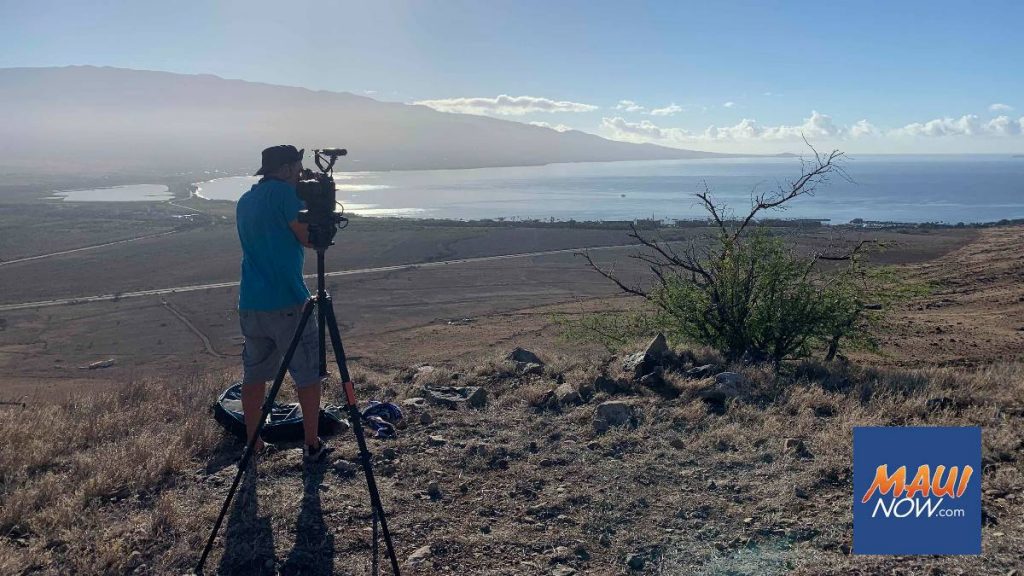Maui council, state set aside money to buy 257 acres in Māʻalaea but developer beats them to it

Within days of a Maui County Council vote to set aside $6.2 million in order to keep 257 acres in Māʻalaea from development, one of Maui’s largest, most polarizing developers scooped up the land.
Peter Martin of West Maui Land Co. purchased all 257 acres for an undisclosed amount. The sale closed May 10, according to Glenn Tremble, company treasurer.
On May 6, Maui County Council unanimously approved $6.2 million to help the public acquire and protect Pōhākea Watershed Lands, also known as Māʻalaea Mauka. Then on May 13, the state Board of Land and Natural Resources approved another $1 million for the purchase.
Eventually, the state had planned to preserve and manage the land, which is riddled with frequent fires and high erosion rates — issues that environmentalists say negatively impact nearby Māʻalaea Bay.
Now, though, the conservation plan is in limbo, and council members said they’re surprised by the sale.
“(I) am just astounded that developer Peter Martin and landowner Spencer family had this deal in their back pocket!!” Council Member Kelly King, whose residency seat covers South Maui, told Maui Now via email Friday. “I believe a lot of folks, including the Mayor, feel blindsided by this turn of events, especially the many citizens who worked on the TPL deal as well as the contract with DLNR to manage the area as a forest preserve.”
Mayor Michael Victorino did not respond to a request for comment.
Council Chairwoman Alice Lee said she didn’t know about the change in owners.
“I’m very surprised,” she said Thursday. “We were having this very public discussion for some time. I’m just surprised.”
Pōhākea Watershed Lands, also known as Māʻalaea Mauka, is located along Honoapiʻilani Highway, just mauka of Maui Ocean Center, Māʻalaea Shops and Māʻalaea Harbor.
While the actual Pōhākea watershed is a 5,268-acre area, the 257 acres eyed by the county and the state was owned by affordable housing developer Jesse Spencer, and later, by son Doug Spencer and siblings.
Environmental groups for years opposed affordable projects pitched for the land by the Spencers, citing traffic, fire risk, erosion, density and other issues.
After dead ends, Doug Spencer and his wife packed up and moved to Virgina about seven years ago to launch a nonprofit that helps children.
Doug Spencer on Friday said his family had been trying to sell the land for many years and grew tired of waiting on the county the last two years of negotiations.
“My mom is 91 in September,” he said. “I will be 65 in July. We are not young people anymore. We were trying to sell this property for seven years. I feel bad in a certain sense, but, you guys, I’ve been waiting for two years. We have to move on.”
The land was appraised at $8.2 million. The Spencer family agreed to sell it to the county for $7 million. And the contract with Martin was $6 million, according to Doug Spencer.
In recent times, Maui Nui Marine Resource Council, Trust for Public Lands, Māʻalaea Village Association and others backed during county and state meetings the public acquisition of the land, which would keep it undeveloped.
Eventually, the state Department of Land and Natural Resources Division of Forestry and Wildlife aimed to steward the land, calling it “an important acquisition for the Division of Forestry and Wildlife.”
J. Scott Fretz, DLNR DOFAW Maui branch manager, during a state Board of Land and Natural Resources meeting May 13 said they, too, were caught off guard by the change in ownership.
Still, he encouraged the board to approve the funding, saying that there’s still hope for public acquisition.
“We have spoken to (Martin’s) associates and they have encouraged us to stay the course and make every effort to make this purchase happen,” Fretz told the board.
Meanwhile, Trust for Public Lands, a national nonprofit that facilitates land acquisitions for community benefit, said it remains committed to working with Maui’s community and public funders to do what’s best.
“TPL recognizes that the Māʻalaea property Peter Martin purchased is extremely important to the community and that active management and stewardship of this land is critical for supporting the watershed and improving water quality issues in Māʻalaea Bay,” said Leah Lani Rothbaum, Hawai’i office project manager. “When Mr. Martin returns from his travels, we are hopeful we can sit down together and negotiate a way forward to persuade him to sell to us so the land can be used for community and environmental benefit.”
Martin gained some supporters in recent years for pitching affordable projects on the west side. Historically, though, he’s known for controversial developments that gave way to gentleman estates and for battling Native Hawaiians over kuleana land and water rights.
When asked whether the land will be developed by West Maui Land Co., Tremble didn’t offer details.
“We have no specific plan yet,” he said via email. “We are open to discussions on the best use of the land.”








